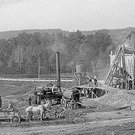The thread that binds us all
To the Editor:
At 3 a.m., the world is the sound of an oxygen machine and the slow beep of a heart holding on. A mother leans over her son’s bed in the ICU, whispering stories into a body that may not wake. Her voice is raw. Her eyes, fierce. She hasn’t eaten. She hasn’t slept. But she stays. Because love doesn’t leave.
At dawn, frost turns the pasture into glass. My sheep move in quiet unison, steam rising from their backs. A lamb, born in the night, trembles but stands. I slip my hands under its belly and feel the wild, stubborn drum of its heart — the same rhythm I’ve felt under a frail wrist in a hospital bed. The same pulse, thin and insistent, whispering: I am still here.
And somewhere else, far from my ICU and my pasture, a father in Gaza sifts through the rubble of what was once his kitchen. His daughter’s ribs press against her skin. The air smells of smoke, hunger, dust. And still — because life is relentless — she reaches for his hand.
In Ukraine, a mother wraps her baby in a blanket as sirens wail. They run toward the freezing dark, leaving their home to burn behind them. She presses her cheek to her child’s head, breathing in the scent of his hair — memorizing it — because she doesn’t know if she will smell it again.
At the United States border, a mother is placed on a bus in the night, her hands empty. Her child remains in a detention center hundreds of miles away. She can still hear her child’s voice calling for her. She can still see the outline of her child’s small body through a chain-link fence.
Loss does not care about borders. It does not stop for faith, politics, or the lines on a map. I have seen it in hospital hallways and lambing barns, in photographs of war zones, in immigration camps, and in the eyes of strangers. It speaks the same language everywhere: What you love may be taken from you.
The will to survive is our first language. But survival isn’t just a pulse. It is bread. It is clean water. It is a safe place to sleep without fear. These are the simple, radical things that should belong to everyone — yet we guard them like treasure and ration them like luxuries.
As a nurse, I know the body is fragile. As a shepherd, I know whole ways of life are fragile too. Loss is inevitable. But starvation is not. Bombing is not. Neglect is not.
Every mother I have seen at a bedside — whether in Manhattan, Gaza, Ukraine, or at our own border — has the same plea written in her eyes: Please, let them live. And I think, if we all looked at each other that way, if we could see a stranger’s child with that same urgency, maybe we could live on this Earth without tearing each other apart.
The sheep know. They move together. They guard their young together. They face the wind together. Maybe we could remember that. Maybe this tired planet still has enough for all of us — if we learn to take only what we need and leave enough for someone else’s child to survive. If we learn to celebrate differences instead of trying to eliminate them.
Loss is the one language every human understands. Survival could be too — if we choose it.
Emily Vincent
Berne
